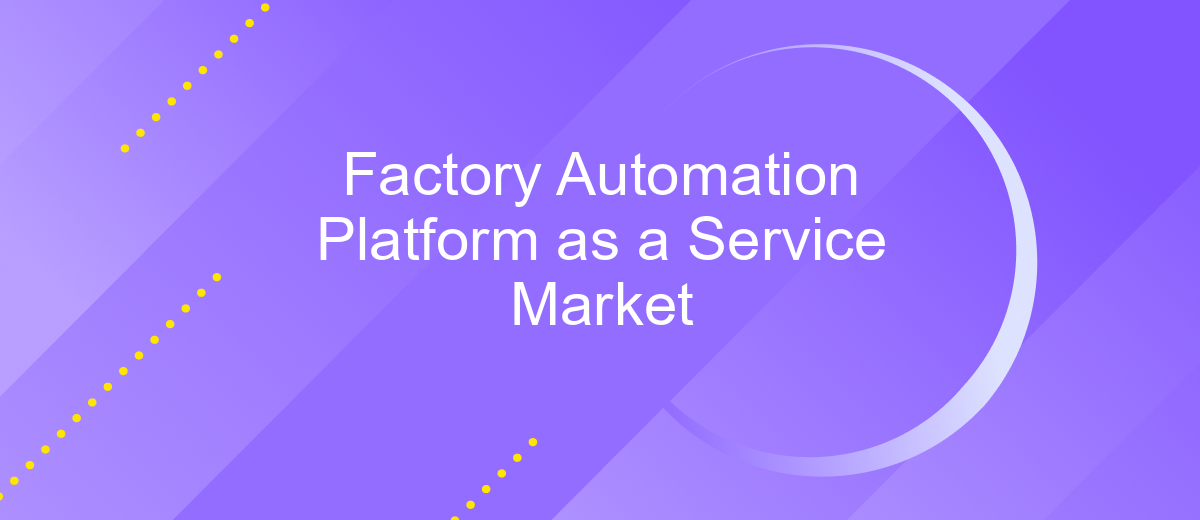Factory Automation Platform as a Service Market
The Factory Automation Platform as a Service (FA PaaS) market is rapidly evolving, driven by the increasing need for efficient, scalable, and cost-effective manufacturing solutions. This innovative approach integrates cloud computing with industrial automation, enabling manufacturers to enhance productivity, streamline operations, and respond swiftly to market demands. This article explores the key trends, benefits, and future prospects of the FA PaaS market.
Executive Summary
The Factory Automation Platform as a Service (FA PaaS) market is witnessing significant growth due to the increasing demand for efficient and cost-effective manufacturing solutions. This market is driven by advancements in IoT, AI, and cloud computing technologies, which enable seamless integration and optimization of factory operations. Companies are adopting FA PaaS to enhance productivity, reduce downtime, and achieve better scalability in their manufacturing processes.
- Rising adoption of IoT and AI in manufacturing.
- Increased demand for scalable and flexible factory solutions.
- Advancements in cloud computing technologies.
- Need for cost-effective and efficient manufacturing processes.
In conclusion, the FA PaaS market is poised for substantial growth as industries continue to seek innovative solutions to streamline their manufacturing operations. With the integration of cutting-edge technologies, the market is set to transform traditional manufacturing practices, offering unprecedented levels of efficiency and scalability.
Market Overview

The Factory Automation Platform as a Service (FA PaaS) market is experiencing significant growth due to the increasing demand for streamlined manufacturing processes. These platforms provide a comprehensive solution for automating various factory operations, enhancing efficiency, and reducing operational costs. By leveraging cloud-based services, FA PaaS enables seamless integration of different manufacturing systems, facilitating real-time data analysis and decision-making. This integration is crucial for industries aiming to achieve higher productivity and maintain a competitive edge in the market.
One of the key drivers of this market is the ability to integrate various tools and services effortlessly. Platforms like ApiX-Drive play a vital role in this aspect by offering robust solutions for connecting different applications and automating workflows. This not only simplifies the integration process but also ensures that all systems work in harmony, leading to improved operational efficiency. As more industries recognize the benefits of automation and integration, the FA PaaS market is expected to continue its upward trajectory, driven by technological advancements and the increasing adoption of smart manufacturing practices.
Competitive Landscape

The Factory Automation Platform as a Service (FA PaaS) market is characterized by the presence of several key players who are continuously innovating to maintain a competitive edge. These companies are focusing on enhancing their product offerings, expanding their geographical presence, and engaging in strategic partnerships and acquisitions to strengthen their market position.
- Siemens AG
- Rockwell Automation
- ABB Ltd.
- Schneider Electric
- Honeywell International Inc.
- Mitsubishi Electric Corporation
- General Electric
- Yokogawa Electric Corporation
- Emerson Electric Co.
- Hitachi Ltd.
These companies are leveraging advanced technologies such as IoT, AI, and machine learning to offer more efficient and reliable automation solutions. The competitive landscape is also shaped by the increasing demand for smart manufacturing solutions, which is driving companies to innovate and provide more integrated and scalable platforms. As a result, the FA PaaS market is expected to witness significant growth in the coming years.
Growth Drivers and Challenges

The Factory Automation Platform as a Service (FA PaaS) market is experiencing significant growth due to several key drivers. One of the primary factors is the increasing demand for efficient manufacturing processes, which is pushing companies to adopt advanced automation solutions. Additionally, the integration of AI and IoT technologies has enhanced the capabilities of these platforms, making them more attractive to manufacturers aiming to optimize their operations.
However, the market also faces several challenges that could potentially hinder its growth. High initial investment costs and the complexity of integrating these platforms with existing systems are major concerns for many businesses. Furthermore, the lack of skilled professionals to manage and maintain these advanced systems poses another significant challenge.
- High demand for efficient manufacturing processes
- Integration of AI and IoT technologies
- High initial investment costs
- Complexity of integration with existing systems
- Lack of skilled professionals
Despite these challenges, the FA PaaS market is poised for robust growth. Companies are increasingly recognizing the long-term benefits of automation, such as reduced operational costs and enhanced productivity, which are expected to outweigh the initial hurdles.


Forecast and Outlook
The Factory Automation Platform as a Service (FA PaaS) market is projected to experience substantial growth over the next decade, driven by advancements in IoT, AI, and machine learning technologies. Companies are increasingly adopting FA PaaS solutions to streamline operations, enhance productivity, and reduce costs. This trend is expected to continue, with a significant increase in demand from industries such as automotive, aerospace, and electronics manufacturing. The integration of advanced analytics and real-time monitoring capabilities will further propel market growth, enabling businesses to make data-driven decisions and optimize their production processes.
In the coming years, the FA PaaS market will also see a surge in the adoption of integration services. Platforms like ApiX-Drive are becoming essential for companies looking to seamlessly connect various automation tools and systems. ApiX-Drive's ability to facilitate smooth data exchange and integration between disparate systems will be a key factor in driving the market forward. As more businesses recognize the importance of interconnected systems for achieving operational efficiency, the demand for such integration services is expected to rise, significantly contributing to the overall growth of the FA PaaS market.
FAQ
What is Factory Automation Platform as a Service (FA PaaS)?
How does FA PaaS benefit manufacturers?
What are the key features of a typical FA PaaS?
How can manufacturers integrate their existing systems with FA PaaS?
What are the challenges in implementing FA PaaS?
Apix-Drive will help optimize business processes, save you from a lot of routine tasks and unnecessary costs for automation, attracting additional specialists. Try setting up a free test connection with ApiX-Drive and see for yourself. Now you have to think about where to invest the freed time and money!

